The Big Secret About Sweet Potatoes That Nobody Wants You To Know

You and I have been lied to. I don’t know why, and I don’t even know if it’s on purpose, but it pisses me off. And here’s why I’m annoyed… As of 2014, 29 MILLION people in the US had Diabetes (type 2), and 86 MILLION people were pre-diabetic. That’s over 105 MILLION people who have problems with insulin sensitivity and blood sugar. And my dad and my mother-in-law fall into those categories – my dad’s been type 2 diabetic for over a decade, and my mother-in-law has been pre-diabetic for about the same amount of time. So this particular issue hits very close to home (literally) for me – and presumably for almost anybody in the US, since you almost certainly know a few people who are at least pre-diabetic.
The Myth About Sweet Potatoes…
Everyone (from doctors, to medical researchers, to even the American Diabetes Association) seems to unanimously state that sweet potatoes are unequivocally great for diabetics (please note that when I mention diabetes in this article, I’m referring to type 2 diabetes). If you don’t believe me, here are just a few examples:
- Why The Sweet Potato Is King by Dr Andrew Weil
- Sweet Potato Fries Recipe
- Researchers reveal sweet potato as weapon against diabetes from NC State University
- Sweet potatoes a diabetic superfood from an Australian health and wellness website
And that’s just the tip of the iceberg. Even on websites that supposedly pay attention to blood-sugar and glycemic load issues, sweet potatoes are almost always classified as a “better” food than things like white potatoes.
Unfortunately…It’s All Completely Untrue!
Listen. I’m not bashing sweet potatoes. Entire cultures have lived very healthily on sweet potatoes. I eat sweet potatoes myself. But I also have pretty good insulin sensitivity. It’s like this. Fish is pretty darn nutritious, and almost everybody agrees. But if you’re allergic to fish, you shouldn’t be eating it. It’s pretty simple. So the question is whether sweet potatoes are a problem for people with blood sugar issues (like diabetics and pre-diabetics). Hint: I’m going to show you how you can test out the results for yourself so you don’t have to believe my word about it.
What Tipped Me Off That It Was All A BIG Lie?
I knew from experience that eating sweet potatoes made me feel sluggish, sleepy, and tired (and I’m not even diabetic in the least – my fasting blood sugar level is typically 85 mg/dL!), so I knew that sweet potatoes were doing something with my blood sugar levels that wasn’t too great. And if they were affecting my blood sugar levels, then they sure as hell were affecting the blood sugar levels of people with type 2 diabetics (like my dad).
My Experiment – How Do Sweet Potatoes Affect My Blood Sugar Levels?
Let me get to some hard facts before I lose you. Coming from a highly scientific background (apparently that physics Bachelors and Masters degrees came into use occasionally), I knew I had to have some proof of what I was ‘feeling.’ So, I busted out my blood glucose meter and started testing. 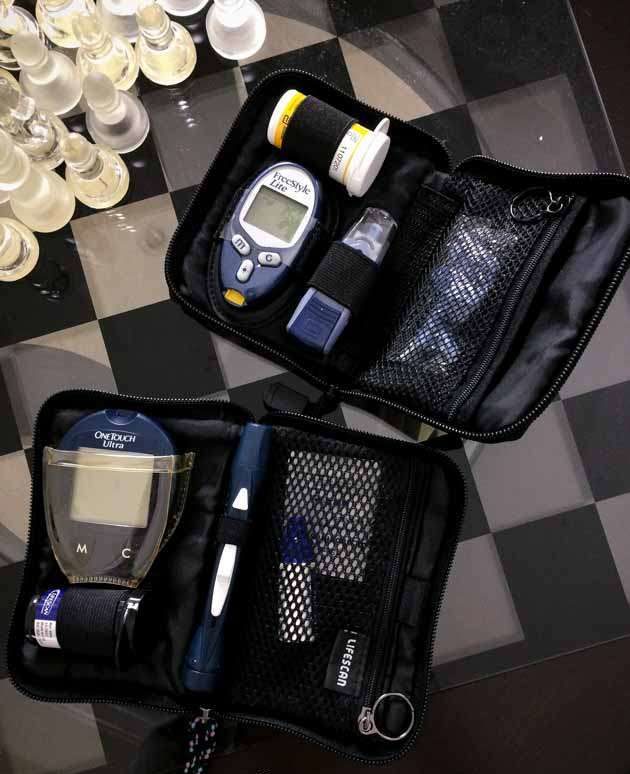
The Results – How My Blood Sugar Spiked After Eating Half A Sweet Potato
I’ve written out below various possible factors that could have affected my blood sugar results as well as more details on how the experiment was conducted, but let me set out the shocking findings first! My Blood Sugar Levels Skyrocketed I’ve detailed some potential experimental errors below, but the simple fact is that my blood sugar went up quite dramatically as you can see from the chart and data table below. And I really felt it too! 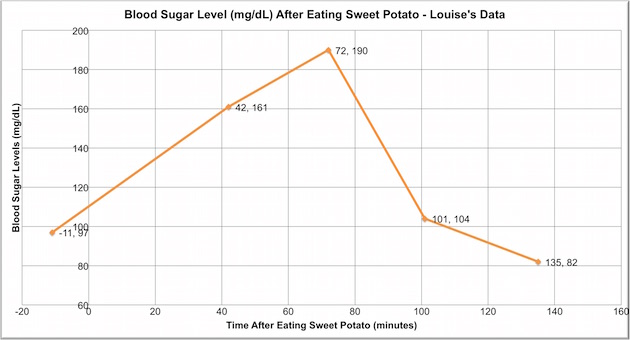

How I Felt After Eating Half The Sweet Potato
I took some notes on how I felt after eating half the sweet potato (8 oz), and this is what I wrote:
Hungry, craving, thirsty, want to eat the other half of the sweet potato, banana, chocolate chips, tired, yawning, eyes dry.
Images of the blood sugar readings and more details about the experiment are recorded below. My Mother-in-law’s Blood Sugar Levels Also Skyrocketed My mother-in-law joined me in the experiment as she loves sweet potatoes but is pre-diabetic. And her results aren’t too different from mine (see the chart and data table below). Her reading started at 120 mg/dL and shot up to 185 mg/dL after 30 minutes! The graph doesn’t look as dramatic because her fasting blood sugar level is higher than mine. 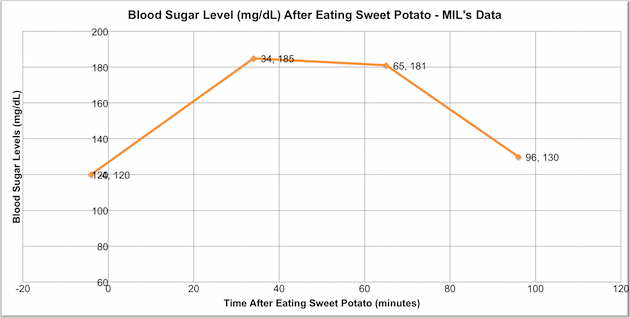
 Both Sets of Data Plotted Together
Both Sets of Data Plotted Together 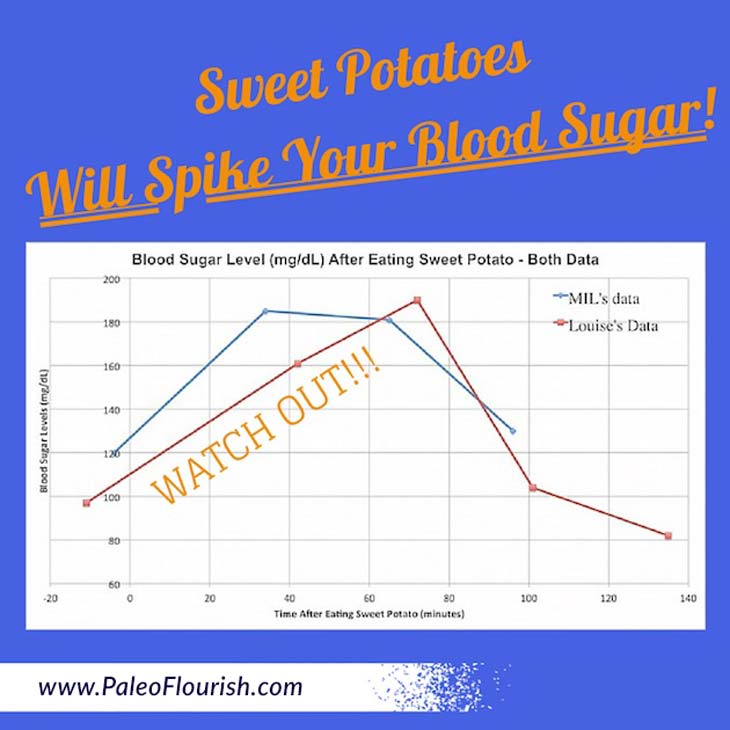
Does That Mean You Can’t Eat Sweet Potatoes??
- If you’re healthy and don’t have any blood sugar issues, then sweet potatoes can be a very nutritious addition to your diet (definitely way more nutritious than many other high carbohydrate foods like bread or pasta).
- If you’re diabetic or pre-diabetic, then you may want to think it over. Get a blood glucose meter and measure your blood sugar levels after your sweet potato meals (there’s more detail below about how to do that).
- If you decide to eat sweet potatoes, eat them with some good fats (like ghee or coconut oil), don’t add any additional sugars to them, eat them as part of a meal that also includes proteins and vegetables, and don’t overeat them! This all ensures that your blood sugar won’t spike too much when eating sweet potatoes.
Why Have Some People Survived From Eating Just Sweet Potatoes?
The Okinawa diet has gotten a lot of press over the past few years, and it’s based on the diet of inhabitants of certain Japanese Islands (the largest of which is Okinawa). They’re considered to have some of the longest life expectancies in the world, but their diet consists largely of purple Okinawan sweet potatoes. So, if sweet potatoes raise blood sugar so much, why are Okinawans able to eat them and live so long? First, nothing in this article is meant to suggest that sweet potatoes are bad for healthy people to eat – in fact, sweet potatoes are a fantastic source of nutrition! But if you have blood sugar issues…then you may need to reconsider… Those Okinawans who lived for ages hadn’t destroyed their health already with a lifetime of poor diet and nutrition and no exercise, so eating sweet potatoes isn’t a problem for their health (in fact, it’s very good for them as it provides them with much needed vitamins and minerals). But let’s face it, if you have blood sugar issues, then you probably haven’t eaten a clean and nutritious diet for your entire life…so what makes you think you can start eating those foods and magically live to be 100?
So Why Do Those Articles Suggest Sweet Potatoes Are Good For Diabetics?
Dr. Weil called sweet potatoes “great for diabetics and people who are carbohydrate sensitive”, but yet as my results above just showed, sweet potatoes are great for spiking your blood sugar levels! So, why would people and organizations who focus on helping diabetics tell you that sweet potatoes are fine to eat?? Here’s what I think:
- They want to make it seem like diabetics can eat sweet tasting foods too. People who are diabetic crave sugary, high-carb foods – after all, it’s probably what led them to become diabetic in the first place (I clearly recall my dad eating entire tins of cookies for dinner for days in a row…he soon after found out that he was diabetic). And we feel bad about telling them that they have to give up all of those sugary foods, so we let them eat the slightly better ones.
- Tips & tricks are what people want to read about. Most of us know pretty well that eating healthy whole foods is good for your body and mind, but it’s too hard to resist the sweet foods. So, telling people they can eat sweet potatoes is at least promoting healthy whole foods.
- Everyone just follows what other people are saying and writing. We can’t question everything we hear or read – it’s just too difficult to know about everything. So, when we hear something that we want to hear we jump on it and spread it like wildfire without double checking its truth.
Please note that I am not trying to bash sweet potatoes or people who promote them as healthy for diabetics (I just don’t think they’ve done the above experiment on themselves!). And I personally love sweet potatoes and think they’re a fantastic source of vitamins, minerals, and amino acids for people who don’t have blood sugar issues.
What About The Scientific Studies Showing Sweet Potatoes To Help Lower Blood Sugar Levels?
Most popular articles (like this one, this one, and this one from Mercola) suggesting that sweet potatoes may help lower blood sugar levels are referencing studies investigating a specific extract found in specific types of sweet potatoes. So, despite the great sounding headlines, these studies are done on people taking a specific extract called caiapo (not the whole sweet potato). And caiapo is extracted from white-skinned sweet potato (Ipomoea batatas) typically only grown in Japan (although caiapo has been found in some NC-grown sweet potatoes). The main issue here is that these studies are isolating one component of sweet potatoes rather than looking at the whole food, so there’s nothing from these studies to support that eating whole sweet potatoes would help diabetics.
Is There Any Science Suggesting Sweet Potatoes Is Good For Diabetics?
Shockingly very little as it happens! A 2014 review of randomised controlled trials concluded that “There is insufficient evidence about the use of sweet potato for type 2 diabetes mellitus.” In particular, they only found 3 trials even worthy of including in their review and even those 3 they described as “very low quality.” In those 3 trials (all performed by the same researcher), they did find a decrease in glycosylated haemoglobin A1c (HbA1c) after 3-5 months, but again all 3 trials were based on providing the sweet potato extract (caiapo) and NOT the whole sweet potato. In fact those 3 trials were all done by the same author as the study described above using caiapo.
Experiment Details
Neither of us ate anything prior to the sweet potato (except I took my morning vitamins and some water, and my mother-in-law took her blood pressure medication). We took a blood sugar reading before eating, and then a reading every 30 minutes after finishing the sweet potato until our levels dropped back down to around our starting level. Here are some potential errors in the experiment: 1. My initial fasting blood sugar level was 86, which is what I’ve measured at most days. However, I didn’t eat the sweet potato until an hour and a half later, and my blood sugar level went up to 97 by that time. The rise could have been due to some of the vitamins I took or else the stress of being on a call for an hour. 2. I did the first 3 readings by pricking the same fingertip, which Jeremy suggested could perhaps cause inaccuracies, although I haven’t seen any scientific literature supporting this. However, my mother-in-law changed fingers for her testing. 3. Blood glucose meters are always inaccurate. This study done on 5 different cheap commercial blood glucose meters showed that there was quite a lot of variation in the results with the FreeStyle Lite performing the best (that’s the one I recommend you get). A recent AADE publication suggests that readings could be more than +/- 20% off (although again the FreeStyle Lite is pretty good). This is what the FreeStyle Lite look like: 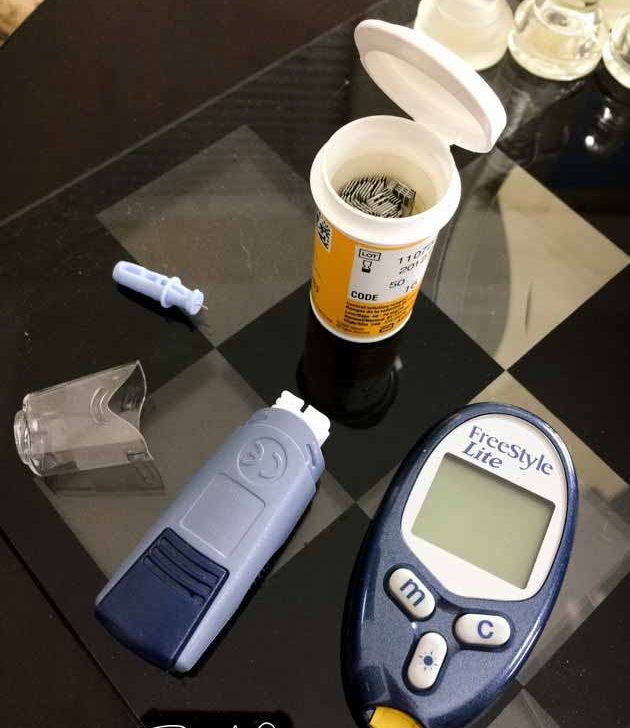
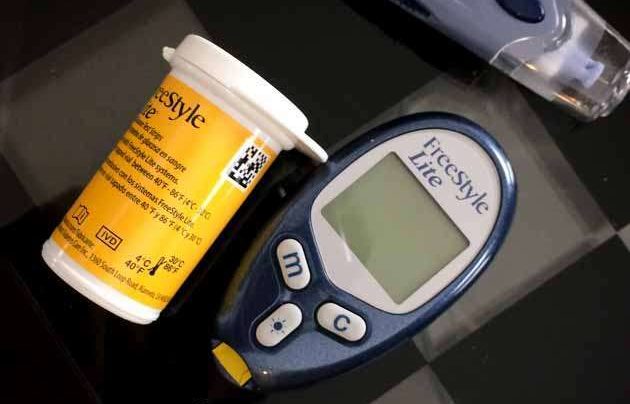 Unfortunately, I used my dad’s OneTouch Ultra for the experiment (as the testing strips for my FreeStyle Lite had expired), and the OneTouch Ultra ranks pretty badly for accuracy! Here are the photos showing my blood glucose meter readings as well as the weight of the sweet potato I ate:
Unfortunately, I used my dad’s OneTouch Ultra for the experiment (as the testing strips for my FreeStyle Lite had expired), and the OneTouch Ultra ranks pretty badly for accuracy! Here are the photos showing my blood glucose meter readings as well as the weight of the sweet potato I ate: 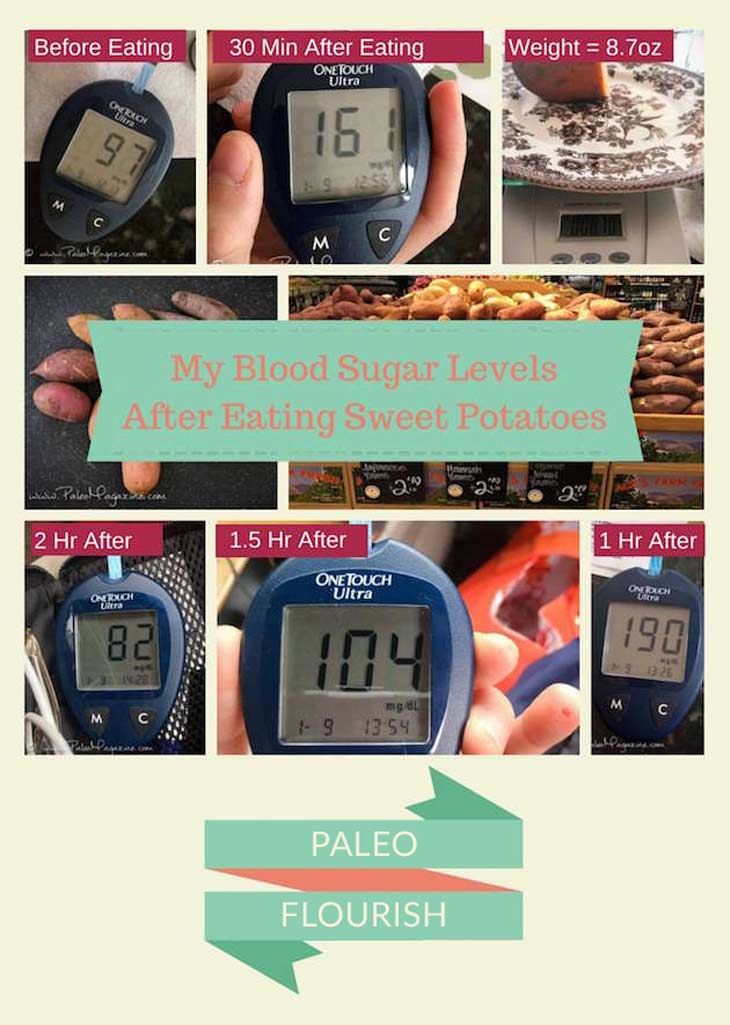 And here are the photos for my mother-in-law’s set of results (she didn’t finish all of her sweet potato):
And here are the photos for my mother-in-law’s set of results (she didn’t finish all of her sweet potato): 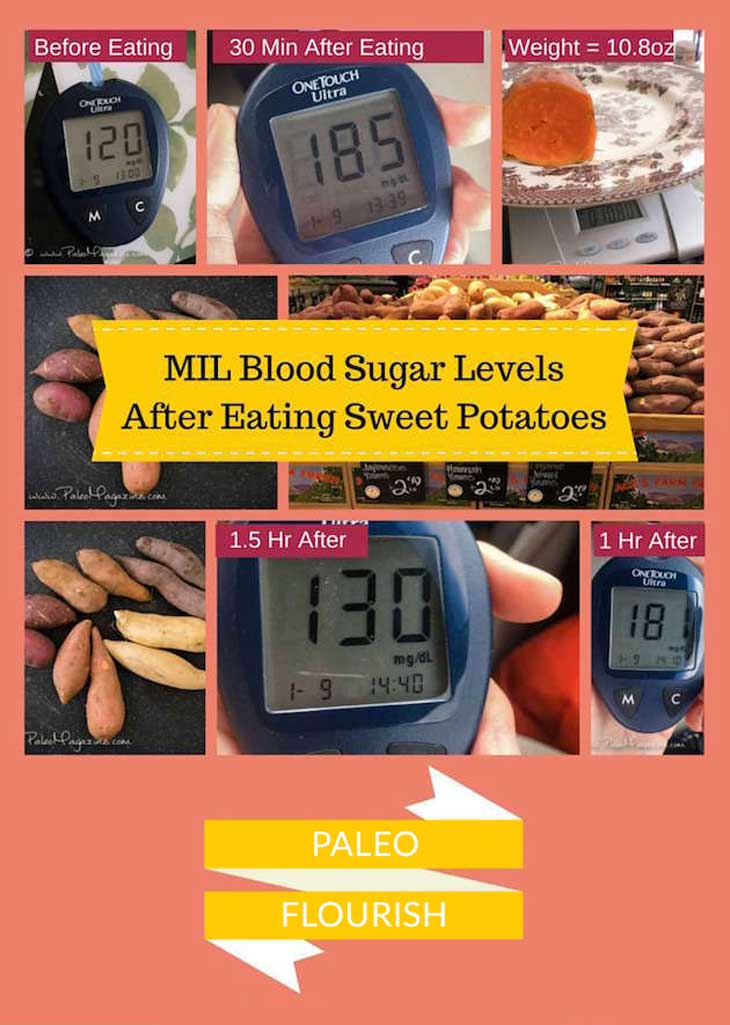
How You Can Measure Your Own Blood Glucose Levels
Blood glucose meters are cheap and easy to use, so don’t rely on what I say or what other websites say, go and test it out for yourself! The FreeStyle Lite blood glucose meter is just $12.90 with free shipping on Amazon (it comes with some lancets – the tiny needles that prick your finger – and some testing strips, but you will need to purchase more strips and lancets if you plan to do regular testing). If you’re diabetic, then you may be able to get a discount by using your medical insurance and Medical Flex accounts in the US.
Post Your Results Here!
Tell us how much your blood sugar levels were raised by sweet potatoes – post your results here and also what else you ate with the sweet potatoes (as that can affect the reading quite a bit).

